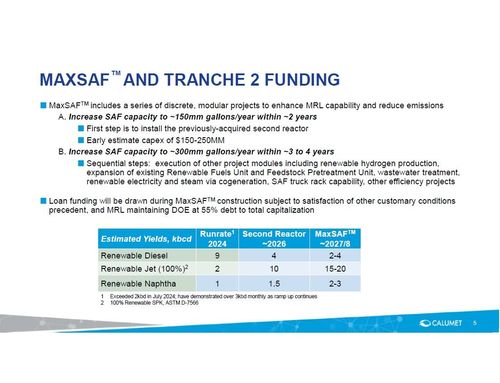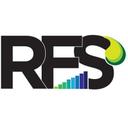Montana Renewables closes $1.44 billion DOE loan guarantee

SOURCE: Calumet Inc.
January 14, 2025
BY Erin Voegele
Calumet Inc. on Jan. 10 announced the closing of a $1.44 billion U.S. Department of Energy loan guarantee to fund construction of Montana Renewables’ MaxSAF initiative, which aims to boost sustainable aviation fuel (SAF) capacity at the biorefinery to 300 MMgy. The facility currently has the capacity to produce approximately 230 MMgy of renewable fuels, including 50 MMgy of SAF.
Calumet in early 2021 announced plans to convert its existing oil refinery in Great Falls, Montana, to renewables by reconfiguring its oversized hydrocracker to process up to 15,000 barrels per day of renewable feedstocks, producing renewable diesel and SAF. The facility began producing on-spec renewable diesel in 2022, with plant capacity at 6,000 barrels per day. The Montana Renewables facility commissioned renewable hydrogen, SAF and feedstock pretreatment systems in early 2023, boosting capacity to 12,000 barrels per day.
Advertisement
The company soon began considering a move to what it calls MaxSAF. The initiative aims to boost total capacity at Montana Renewables to 18,000 barrels per day, including 15,000 barrels per day of SAF. Calumet pursued a DOE loan guarantee to support its MaxSAF initiative and in October 2024 announced it had been awarded a conditional commitment for a loan guarantee of up to $1.44 billion to fund the project.
Montana Renewables on Jan. 10 announced the closing of the $1.44 billion guarantee loan facility with the DOE’s Loan Program Office. The loan will fund the construction and expansion of the renewable fuels facility owned by Montana Renewables. The planned expansion includes a second renewable fuels reactor, debottlenecking of existing units, installation of SAF blending and logistics assets, increased renewable hydrogen production, cogeneration for renewable electricity and steam, and on-site water treatment and recycling capabilities.
During a conference call held Jan. 13, Calumet CEO Todd Borgmann discussed current operations at Montana Renewables and the timeline for implementation of the MaxSAF initiative.
Advertisement
According to Borgmann, Monana Renewables’ SAF capacity expanded significantly last year. Around mid-year, the facility was producing at a run-rate of approximately 30 MMgy, expanding to 40 MMgy in the third quarter and reaching 50 MMgy by the end of 2024.
Borgmann said the MaxSAF project will allow the facility to expand SAF capacity to 150 MMgy over the next two years, before growing to 300 MMgy. Calumet currently expects approximately 150 MMgy of SAF capacity to be online by 2026. The full 300 MMgy of SAF capacity is expected to be operational within three to four years. In addition to SAF, the Montana Renewables facility will continue to produce renewable diesel and naphtha, with capacity estimated at 61 MMgy and 23 MMgy, respectively in 2026.
"This is essentially the largest agricultural investment in Montana history and will double our purchases of seed oils and tallow from approximately 1.5 billion pounds per year today to 3 billion pounds per year post expansion. This is possible through the strong support and partnership of DOE and follows over two years of detailed due diligence," said Bruce Fleming, CEO of Montana Renewables, in a statement. "Our MaxSAF expansion drives regional economic development by creating jobs, supporting the broader agricultural industry, and positioning the State of Montana as a global leader in renewable fuels in a practical and highly economic way with technology that we have developed and derisked here in the United States."
Related Stories
MOL Group has produced a diesel fuel containing hydrotreated vegetable oil (HVO), and sustainable aviation fuel (SAF) at the refinery of Slovnaft in Bratislava. The quality of the products has been verified by radioisotope analysis.
More than 1.76 billion renewable identification numbers (RINs) were generated under the Renewable Fuel Standard in January, down from 1.91 billion generated during the same period of 2024, according to data released by the U.S. EPA on Feb. 20.
The U.S. EPA on Feb. 20 released updated small refinery exemption (SRE) data showing that 13 previously denied SRE petitions for Renewable Fuel Standard compliance years 2021 and 2022 are being reconsidered. No new SRE petitions were filed.
A coalition of biofuel, agriculture, fuel retailer and petroleum trade groups on Feb. 19 sent a letter to U.S. EPA Administrator Lee Zeldin urging the agency to set robust, timely, multiyear RFS RVOs for 2026 and beyond.
OMV Petrom has announced the start of construction for a sustainable aviation fuel (SAF) and renewable diesel (HVO) production unit at the Petrobrazi refinery in Romania. The new facility will have an annual capacity of 250,000 tons.
Upcoming Events










